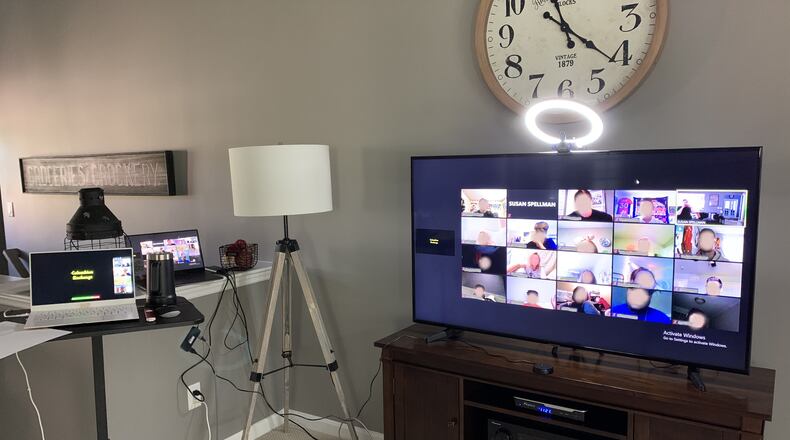Kuznekoff, a communications instructor, has a infant boy at home and decided to take a safer option for his family of teaching from home rather than in his usual classroom.
So the first week of remote classes, which began Monday, has also been a learning experience for Kuznekoff and many of other Miami University professors and instructors as they adjust to teaching from their homes or from their classrooms on campus.
He and other professors said it takes major adjustments on their parts and from the students on the other side of the digital classroom connection.
“My strong preference is face-to-face interaction because you can pick up cues from students. And I miss having those brief conversations before or after classes,” said Kuznekoff.
Kuznekoff researched the best ways to enhance his online presentations from his living room to his nearly 70 students who normally attend in-person classes at Miami’s Middletown, Hamilton and main Oxford campus.
Lighting and sound are key, so he uses extra illumination in his living room and wears a lapel microphone.
“The built-in microphones on computers are not good,” he said.
It’s an historic adjustment for the university, which has plans to restore in-person classes after five weeks of remote learning.
In March, the school – like most universities across the nation – scrambled to cobble together remote learning programs after the coronavirus forced the closure of schools.
“This semester will be different, but we will remain connected, take care of one another, and stay optimistic as we learn, study, and discover together,” said Miami University President Gregory Crawford.
“We have also outfitted our classrooms with some new technologies so our faculty can effectively perform hybrid instruction, including wireless microphones, the ability to show presentations in videoconferences, and Ladibug document cameras that act as webcams and virtual whiteboards.”
David Seidl, vice president for information technology at Miami, said that “the biggest effort we made through the summer was to upgrade the classroom technology in over 400 classrooms on the Oxford and regional campuses to enhance hybrid instruction.
“This included adding things like wireless microphones, using existing or adding flexible document cameras that act as webcams and interactive whiteboards, and building in the ability to make projected content look like a camera for online classes.”
Miami University Associate Professor of history Susan Spellman is also teaching from her home and described the first week as “challenging times.”
“It’s going well in general. You do the best you can to replicate what I would do in a face-to-face classroom but technology has its limitations,” said Spellman.
In-person instruction provides “a lot of visual clues from my students and whether they are understanding the material and if the (mental) light bulb is going on for them,” she said.
About the Author

